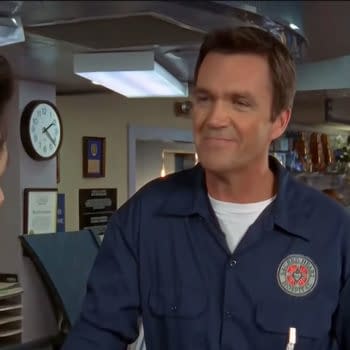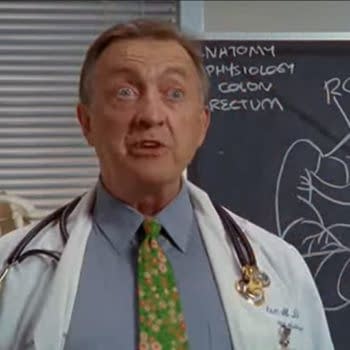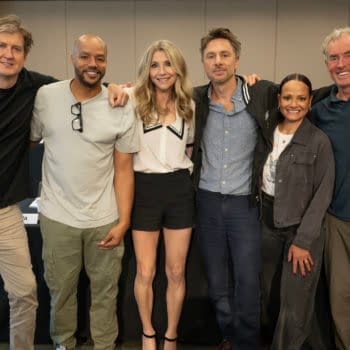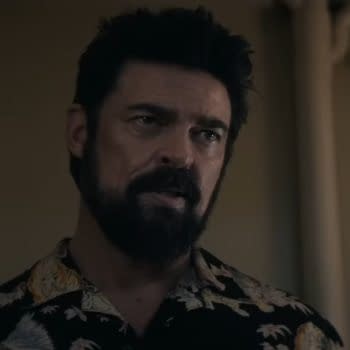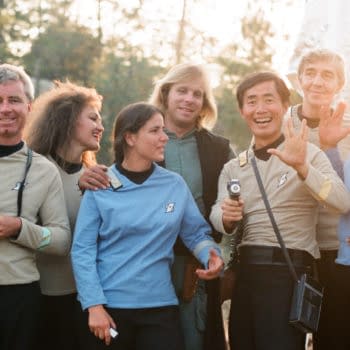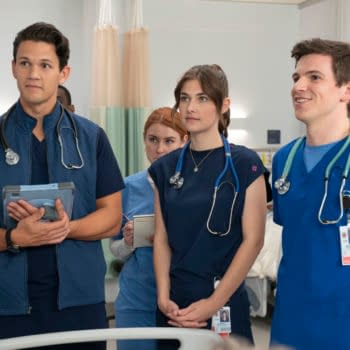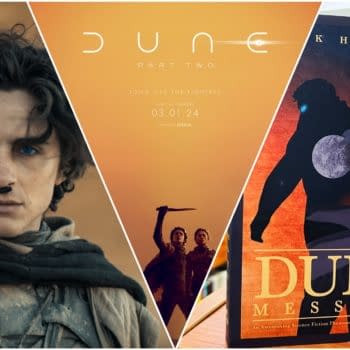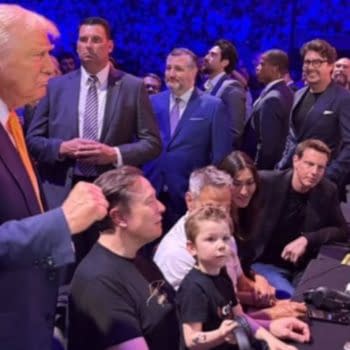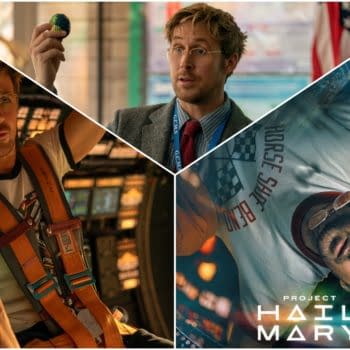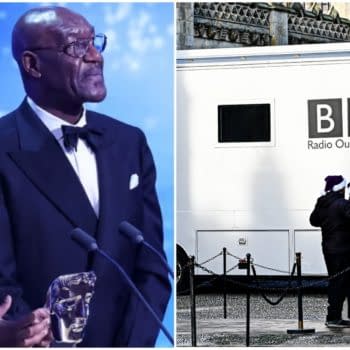Posted in: Exclusive, Interview, Movies | Tagged: Colm Meaney, exclusive, interview, Jesse Hutch, The Ballad of Davy Crockett, William Moseley
The Ballad of Davy Crockett Star William Moseley on Playing Folk Hero
William Moseley (The Chroncles of Narnia) spoke to Bleeding Cool about his latest Western in WMI's The Ballad of Davy Crockett, prep & more.
Article Summary
- William Moseley stars as Davy Crockett in new Western film by VMI.
- Moseley shares his intensive prep work for the physically demanding role.
- Discussions on set dynamics and working with director Derek Estlin Purvis.
- Moseley navigates challenges of roping scenes and talks co-star camaraderie.
For anyone who grew up on classic Westerns or any American history buff, Davy Crockett became one of the 19th century's most revered and accomplished frontiersmen, soldiers, and politicians in the country. While most of his exploits have been well documented, he's been romanticized through popular culture far more during his life as a soldier and frontiersman than his stint serving Tennessee in the U.S. House and the state's general assembly. His legend grew even more with his final stand, dying at the Alamo during the Texas Revolution in 1836. William Moseley was given another golden opportunity from playing one larger-than-life hero in The Chronicles of Narnia protagonist in Peter Pevensie to another as Crockett in VMI Worldwides' The Ballad of Davy Crockett. Directed by Derek Estlin Purvis, the film is set in 1815 and tells the story of an American Legend whose wife has fallen deathly ill, leaving his young children to survive on their own. Davy must embark on a perilous journey fighting off danger and enemies across the wild frontier. Mosley spoke to Bleeding Cool about growing up on his passion for Westerns, intense prep, working with Purvis, castmates, and more.
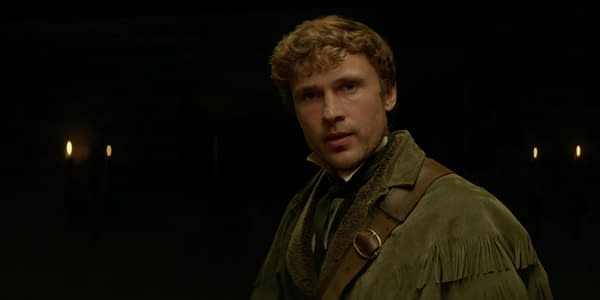
The Ballad of Davy Crockett: William Moseley on Bringing 19th Century Hero to 21st Century
Bleeding Cool: What intrigued you about 'The Ballad of Davy Crockett?'
Moseley: I've always been a massive fan of Westerns. I've never made a Western, but I always wanted one. I've seen everything from 'Unforgiven' (1992), 'The Good, the Bad, and the Ugly' (1966), Once Upon a Time in the West (1968), and 'Red River' (1948). We always had 'Doctor Quinn, [Medicine Woman]' playing on TV. My mom loved 'Rawhide' when I was younger. I remember Westerns being a part of my life, and when I got the opportunity to be in one, not just any old Western, but an American frontier icon like Davy Crockett, I jumped at the chance. I was grateful they offered me the role, and I got my skills up to play Davy Crockett.
Were there figures from Westerns you modeled your performance after?
I knew Davy Crockett was a very physical person, a frontiersman, and a bear hunter, and he built cabins. At one point, he might have even had a whiskey distillery in his life. I had to find the character from the outside. What I did was I said to the director, "Can I get to Tennessee two weeks early and work with the cowboys there who were doing all the horse work on the film and learn how to do all this stuff?" This horse-riding stuff, shooting and roping from a horse. I spent four hours a day on the horse. Sometimes, I'd be there for eight hours if I were to learn everything, like I learned how to do a bowline knot. I set out to know how to do everything to get in touch with my horse. When you get on set, it's a different atmosphere than when you're practicing, and it's a lot for the animals. I wanted to be in touch with the horse once I was on set. When I was around those cowboys and wranglers, I started to feel Davy Crockett inside because I was still the person, and those guys gave me him, and they gave me the energy that I needed to play him.
How does prep work differ on a physically demanding role on an indie project as opposed to a bigger budget film?
I prepped for the fight scenes four months in advance on a' Narnia' movie. The final fight with Miraz (Sergio Castellitto) in the second movie. That was a 120-beat sword fight, so we had to prep that for four months prior before we shot that. Then the horse work, I prepped weeks and months in advance, but for 'Davy Crockett,' I was fortunate that I could already do all those stunts. I learned it from a bigger movie. I learned a lot of horse-riding stuff. I've learned of the fight sequences, like 'Narnia,' so when we get the time, I can come and pick it up. If we ever had a day when there was a problem with, for instance, we had issues with the wolves. Sometimes, they didn't do what the director needed them to do, so we would put in a fight scene instead of a wolf fight scene, and I could pick it up quickly. Obviously, you have more prep in a big movie, but you make it work on a small film.
How do you break down what kind of set Derek has run since he wrote and directed the film? What was that experience like?
Working with Derek was fantastic. He gave me a lot of space. He wasn't micromanaging me, which you have with some directors. They have a vision for the scene, reaction, and emotional moments. They want that exactly as they imagined it. Sometimes, that can be incredibly specific, whereas Derek trusted that what I would bring would work for Davy and me. I listened to him as much as I possibly could, like every bit of nuance, everything. He was interested in everything he talked about. I tried to bring that to the character and the scenes, which they were specific to. Working with Derek was a dream. I hope I get to work with him again. There are talks.
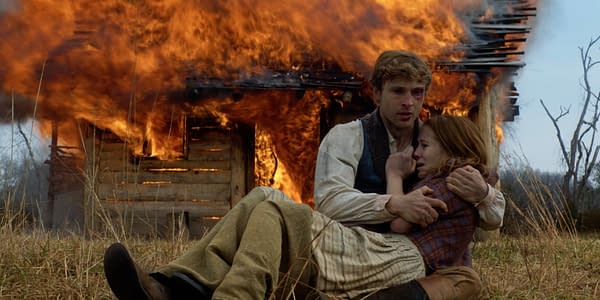
Can you talk about your cast mates? You're working with a 'Star Trek' legend in Colm Meaney. What was it like to share space with him? Did you guys talk about the craft between scenes?
Colm Meaney is a seasoned pro. He's like Liam Neeson; they're both legends of Ireland and fantastic actors. I worked with Liam before [on the 'Narnia' franchise], and talking to him is like talking to Colm. They take the craft very seriously, and they take what they do seriously. They're craftsmen like painters, artists, or sculptors who care about their work. They're looking at it from all different angles. You pick that brain, and you pick it up a little bit, but you don't want to overstep because you don't feel like you are interrogating them. You just have to kind of go calmly with that.
What about your other costars like Jesse [Hutch], Valerie [Jane Parker], Wyatt [Parker], and Nico [Tirozzi]? What was it like working with them?
I'm fortunate that I worked with Wyatt and Nico, these two great young actor kids. One day, I'll tell you a funny story…they wanted me to go to the Cumberland cavern or tunnels. I can be brave on a horse and do all these things, but I do get claustrophobic. I thought, "It would be a great, big, cavernous space when we get there. It'd be like stalagmites. When we first arrived, you first had to prove that you could crawl through a chair, and the chair was probably…I want to say about fitting my body. I could get my body if I pushed myself through it, and I did it.
Suddenly, I realized we would be going through tunnels like that, and the girl guiding us said, "Is anyone here claustrophobic?" I'm happy to be the father of an eight-year-old, and this other kid here, like these two kids, they can't see me looking weak, so I didn't say anything. It was completely black when we were 100 feet underground, and I couldn't even crawl on my hands and knees. I'd crawl like this through the cave, and I almost had a panic attack [laughs], but I managed to keep it together. These kids helped me conquer my claustrophobia, so they were great.
That's the deal of playing a heroic character. You can't look unheroic even in your normal life. Valerie was great, and she's a very talented actress. She's wholly switched on and emotionally present. She's good and technically sound. Jesse is a brilliant and a nice man. I went to the gym with him, and it was great. I was fortunate with the cast. They all supported me and [the idea of] an English guy playing an American hero. I thought there might be some problem, and maybe people might put up the guard of it. I was worried that I would have to earn my respect with everybody, and I hoped everybody would do it by the end.
Were there any intense sequences that stood out to you that were more difficult to get through than others, or would they venture too much into spoiler territory?
There is one physically tricky scene, and it doesn't look difficult on camera. I sort of panic, and that's always the way. You might throw yourself on the ground eight times when you look like you're getting punched, and you're never even getting hit. That looks bad, but the hardest thing that I did and learned was roping from a horse that you're galloping on. I had to use the lasso while galloping the horse, and then I had to catch a tree branch as big as a tree trunk. I saw it with the rope, and then I had to pull it to create a barricade to stop the guard from following right behind me. You must land it perfectly.
When you throw the lasso when you're galloping, you must land it perfectly on that piece of tree trunk with the cameras there, the sound guys, and all these people around the skittish horses. I was concerned since it was a bit jumpy all day. I was also worried I wouldn't be able to hit the thing after all this practice that I wouldn't be able to do it. Fortunately, on the third or second go, I got it right and hit it. It gave me respect for cowboys when they're roping an animal that's moving one way, and they're galloping in this way. You must dally around the pommel, and you must know how to wrap the rope at the same time as throwing the lasso. It's easy to catch your finger, and if you catch your finger, that's probably [costs you] one of your fingers. That was probably the toughest thing I did. It doesn't even look much from the camera, but that was it.
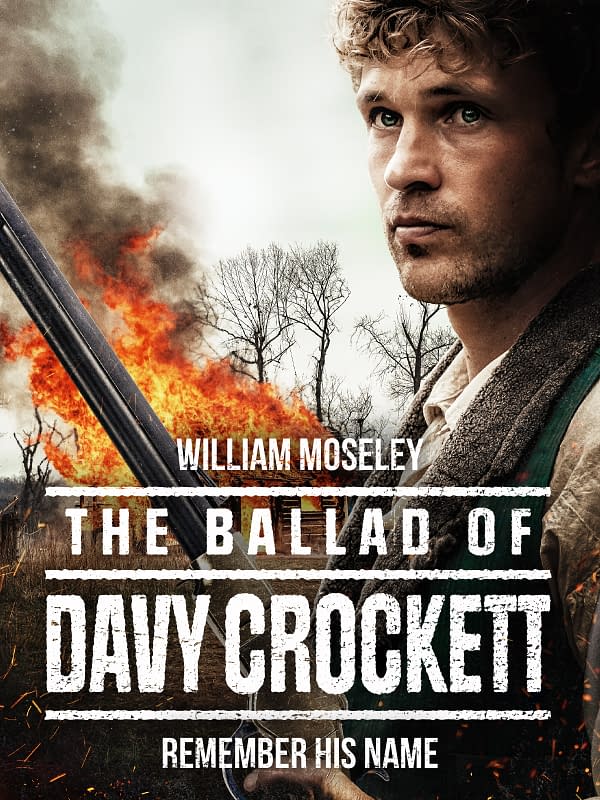
The Ballad of Davy Crockett is now playing in select theaters and on-demand.






